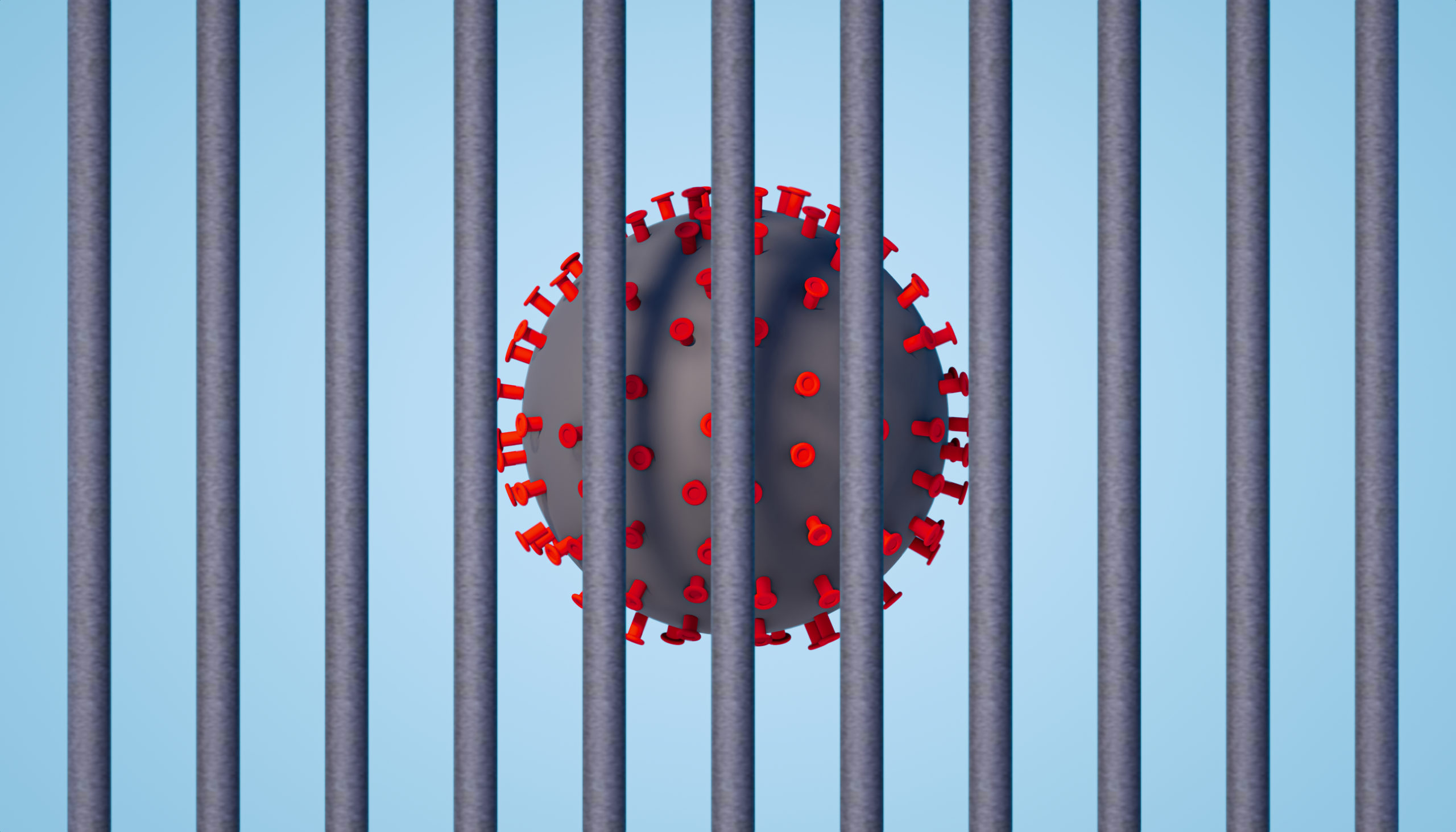A Pandemic of Litigation: Prisons and COVID-19 Class Actions
Much like COVID-19 itself, a pandemic of class-action litigation has spread across this nation between two age-old foes: prisons, and their prisoners. Unlike most of the litigation arising from COVID-19 across the country, prisoners are taking a unique legal position: the failure of the government to take precautions against COVID-19 is unconstitutional. In cases filed by prisoners seeking collective relief from the rapid spread of COVID-19 within their respective prisons, however, motions for class certification have revealed complicated answers to questions that appear, at first blush, to have simple resolutions: whether classes of prisoners are “ascertainable” and whether, in the context of a pandemic, prisoners can satisfy the commonality requirement of Federal Rule of Civil Procedure 23.
A National Push to Improve Living Conditions
After filing dozens of class actions in courts across the United States, prisoners are, in many instances, prevailing. Courts are repeatedly finding that States have a constitutional duty to enforce COVID-19 mitigation measures among prison populations. Referring to the COVID-19 outbreak at San Quentin as the “worst epidemiological disaster in California correctional history,” the Marin County Superior Court issued a 116-page ruling determining that the failure to take precautions to mitigate the spread of COVID-19 was “cruel and unusual” within the meaning of the Eighth Amendment. After prisoners filed a class-action lawsuit in Maryland, they reached a settlement with the State guaranteeing weekly COVID testing, vaccinations, masks, and isolation for all new cohorts of prisoners. In Hawaii, a class-action lawsuit brought by prisoners resulted in a settlement which created a five-person panel that would be given free rein to assess prison conditions and assist in the implementation of measures to reduce the spread of COVID-19. In Pennsylvania, the City of Philadelphia agreed to pay $125,000 to settle a class-action lawsuit brought by prisoners alleging that the city’s jails did not comply with the rules requiring that prisoners receive a minimum of three hours out of their cells each day. After initially being excluded from New York’s vaccination rollout, prisoners filed a class-action lawsuit seeking inclusion in the State’s vaccination plan and prevailed—the court found that the State’s actions were “by definition arbitrary and capricious.”
Closer to Home: The Action at Federal Correctional Complex Butner
North Carolina is not immune from the ongoing spread of class-action litigation arising from prison conditions. In October 2020, prisoners at Federal Correctional Complex Butner (“FCC Butner”) filed a class-action lawsuit in the United States District Court for the Eastern District of North Carolina against the facility and its administrators for injunctive and declaratory relief and for habeas corpus. Charles Hallinan, et. al., v. Thomas Scrantino, et. al., No. 5:20-CT-03333-M (E.D.N.C. 2020). Unlike other class-action lawsuits arising from COVID-19, the FCC Butner litigation is unique in that plaintiffs’ claims are premised on a violation of Section 504 of the Rehabilitation Act, which prohibits discrimination against individuals with “disabilities,” including cancer, kidney disease, COPD, and a host of other serious illnesses. Plaintiffs assert that FCC Butner’s response to COVID-19 constitutes disability discrimination in that the facility has failed to make reasonable accommodations and implemented facially neutral policies that disparately impact people with medical disabilities. Plaintiffs seek (1) immediate release of medically vulnerable inmates, (2) a declaratory judgment that FCC Butner’s policies violate the Eighth Amendment, and (3) that the court order the facility to create and implement a COVID-19 mitigation plan consistent with CDC guidelines.
Unlike many of the other prisoner class-action cases pending across the United States, Plaintiffs’ Motion to Certify Class under Rule 23(b)(2) has now been pending for longer than a year. Despite extensive briefing, a ruling has not yet been made.
Rule 23(b)(2) of the Federal Rules of Civil Procedure provides that a class action may be maintained if “the party opposing the class has acted or refused to act on grounds that apply generally to the class, so that final injunctive relief or corresponding declaratory relief is appropriate respecting the class as a whole.” In that light, Plaintiffs are broadly seeking class certification as “all persons currently or in the future incarcerated at FCC Butner while anyone on the premises is infected with COVID-19.” Plaintiffs also request the certification of a subclass for all class members who are “medically vulnerable and at high risk of severe illness or death from COVID-19 due to disabilities protected under Section 504 of the Rehabilitation Act…”(the “Subclass”).
Federal Rule of Civil Procedure 23 governs class actions. The basic rules are well-known and simply stated: (1) numerosity, (2) commonality, (3) typicality, and (4) adequacy. Though it may seem that a class action asserted by a group of 5,000 people living in the same building may easily satisfy these requirements, this is not necessarily the case within the context of COVID-19. As is illustrated in the FCC Butner litigation, a key dispute between the parties is whether plaintiff’s proposed class is ascertainable, and whether the claims of the proposed class members satisfy the commonality requirement of Rule 23(a.) Krakauer v. Dish Network, L.L.C., 925 F. 3d. 643, 655-55 (4th Cir.), cert. denied. 140 S. Ct. 676, 205 L. Ed. 2d 440 (2019); Berry v. Schulman, 807 F.3d. 600, 608 (4th Cir. 2015).
Ascertainability and Commonality
Plaintiffs’ arguments in support of ascertainably are simple: the potential class members all reside at FCC Butner. To ascertain the primary class, Plaintiffs argue, FCC Butner need only look at its roster. If those individuals were present at FCC Butner when people with COVID-19 were also present, then they are part of the class. Plaintiffs also contend that the members of the Subclass are similarly identified by objective criteria: FCC Butner must only look to the disability diagnoses codes given to patients by physicians at FCC Butner.
Commonality, Plaintiffs argue, is also easily satisfied. To show commonality, plaintiffs must show that the class members suffered the same injury, that the injury raises common questions, and that class certification has the capacity to “generate common answers apt to drive the resolution of the litigation.” Wal-Mart Stores, Inc. v. Dukes, 564 U.S. 338, 349-50 (2011). At FCC Butner, the proposed class members are all subject to the exact same living conditions and policies, and all face a heightened risk of contracting COVID-19 due to allegedly unconstitutional (deliberately indifferent) living conditions. When a set of policies applies to all plaintiffs and all putative class members, Plaintiffs argue, commonality is easily satisfied: “the policies and practices at issue are either illegal as to all class members or as to none of them.” DeGildo v. Crazy Horse Saloon & Rest., Inc. No. 4:13-CV-02136-BHH, 2017 WL 5624310, at *11 (D.S.C. Jan. 26, 2017), aff’d and remanded, 880 F.3d. 135 (4th Cir. 2018). Similarly, the proposed class members seek the same “answers:” injunctive relief for the implementation of a COVID-19 mitigation plan, and for FCC Butner to identify all incarcerated persons who are appropriate for release and, to the greatest extent possible, release them.
Defendants, on the other hand, contend that it is “facially apparent” that there is no ascertainable class. To be ascertainable, a class must be “readily identifiable” by the court through “objective criteria.” Krakauer, 925 F3d. at 654-55 (4th Cir. 2019); see EQT Prod. Co. v. Adair, 764 F.3d 347, 358-60 (4th Cir. 2014). Concerning the primary class, Defendants argue that the Plaintiffs’ inclusion of all persons incarcerated at FCC Butner “while anyone on the premises is infected with COVID-19” would require the court to engage in individualized factfinding: first, to determine whether anyone is infected with COVID-19, and then to determine who was in custody at FCC Butner on those specific days.
Defendants’ strongest argument against class certification arises from the question of commonality. While Plaintiffs purport to present common questions, Defendants argue that those questions cannot be resolved without conducting a particularized inquiry into each inmate’s background. For instance, concerning Plaintiffs’ demand for early release, Defendants argue that each putative class member comes with a unique situation—unique crimes, sentences, release dates, disciplinary histories, ages, medical histories, proximities to infected inmates, availabilities of home landing spots, propensities for recidivism, and abilities to care for themselves. These differences in background, Defendants argue, eliminate the ability for the class to generate common answers to their purportedly common question. Simply put, there is no way to decide which inmates would qualify for early release and which inmates should go without diving into an inmate specific inquiry.
Defendants similarly argue that Plaintiffs’ claims are far too overbroad in the context of COVID-19. To support class certification, plaintiffs’ claims must “depend upon a common contention…. That common contention, moreover, must be of such a nature that it is capable of classwide resolution—which means that determination of its truth or falsity will resolve an issue that is central to the validity of each one of the claims in one stroke.” Dukes, 564 U.S. at 350 (2011). In light of this rule, Defendants assert that Plaintiffs’ position is fundamentally flawed: in the context of COVID-19, it is not true that “policies and practices” applicable to a group of plaintiffs are either “illegal as to all class members or as to none of them.” To the contrary, Defendants argue that is impossible to determine whether FCC Butner was “deliberately different” with respect to its inmates without considering an individual inmate’s medical background and needs because COVID-19 affects people in considerably different ways. For instance, what may be deliberately indifferent for a seventy-year-old inmate with cancer might not be deliberately indifferent for a healthy twenty-year-old inmate with no other underlying illnesses.
Another factor, which has nothing to do with either party but will likely inure to the benefit of Defendants, is time. Initial briefing on the Plaintiffs’ Motion for Class Action Certification was complete on January 1, 2021, with a surreply filed on May 5, 2021. Since that time, at least three highly effective vaccines have been deployed across the country, including at FCC Butner. However, three of the named Plaintiffs refused the vaccine. Their decision to forego the vaccine will almost certainly put them at odds with the interests of their proposed classes, and will cut against their attempts at class certification in that they may not be “adequate” class representatives as required by Rule 23 of the Federal Rules of Civil Procedure.
Awaiting a Ruling
On October 8, 2021, Plaintiffs’ Motion to Certify Class was referred to Judge Louise Flanagan’s chambers, to be considered with Defendants’ Motion to Dismiss or in the alternative Motion for Summary Judgment. It is difficult to know how the Court will rule, as there are cases standing for the arguments advanced by each party. For instance, while the Marin County Superior Court granted class certification in California, the United States District Court for the Northern District of Illinois, Eastern Division, denied class certification based, in part, on lack of commonality. Money v. Pritzker, 453 F. Supp. 3d 1103 (N.D. Ill. 2020).
To the extent an outcome can be discerned, Defendants’ arguments against certification on the basis of commonality are strong. “Deliberate indifference” is a uniquely high standard, and approaches “total unconcern” with a prisoner’s welfare. Duane v. Lane, 959 F.2d 673, 676 (7th Cir. 1992). In the context of COVID-19, where treatment and mitigation measures have shifted dramatically since January 2021, it will be very difficult to determine whether FCC Butner was deliberately indifferent to its 5,000 inmates without conducting a highly fact-intensive inquiry with respect to each inmate—in effect, requiring thousands of “mini-trials.”
There is no timeframe for the Court to make a ruling. Once a ruling is made, this post will be supplemented with an explanation of the Court’s decision.
Click here to subscribe to our monthly “Best In Class” blog.
**Ellis & Winters’s Best in Class Blog covers developments in class actions in courts across the United States, focusing on insights for class-action defense.**



